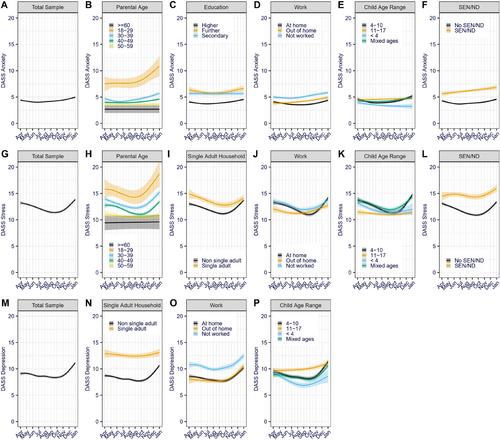Changes in UK parental mental health symptoms over 10 months of the COVID-19 pandemic
Abstract
Background
The threats to health, associated restrictions and economic consequences of the COVID-19 pandemic have been linked to increases in mental health difficulties for many. Parents, in particular, have experienced many challenges such as having to combine work with home-schooling their children and other caring responsibilities. Yet, it remains unclear how parental mental health has changed throughout the pandemic or what factors may have mitigated or compounded the impact of the pandemic on parents' mental health.
Methods
We examined monthly survey data from two linked UK-based longitudinal studies: COVID-19: Supporting Parents, Adolescents and Children during Epidemics' (Co-SPACE) and COVID-19: Supporting Parents and Young Children during Epidemics' (Co-SPYCE). Data from 5576 parents/carers of 2–17-year-old children collected between April 2020 and January 2021 was analysed using mixed-effect modelling and latent class growth (mixture) modelling.
Results
Parental stress and depression, but not anxiety, were higher during the periods of restrictions. This pattern was most pronounced for parents with primary-school-aged children, those that worked at home or had other adults in the household. Being younger, reporting secondary or below education, working out of home, having secondary-school-aged children or children with special education needs (SEN)/neurodevelopmental disorders (ND) further moderated whether, how and when parental mental health symptoms changed. Although around three quarters of parents reported consistently low mental health symptoms, a substantial minority reported consistently high or increasing symptoms of anxiety, stress and depression. The latter were more likely to be parents who were younger than average, were a single adult in the household, had a pre-existing mental health diagnosis or had a child with special educational needs or a ND.
Conclusions
These findings emphasise how different personal circumstances and pre-existing inequalities shaped how parents were affected by this unprecedented global pandemic and highlight the need for support and consideration to meet the needs of families in the future.


 求助内容:
求助内容: 应助结果提醒方式:
应助结果提醒方式:


